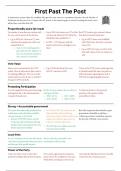FORMATION OF A CONTRACT CHECKLIST:
- Offer (valid offer?)
- Acceptance (valid acceptance?)
- Consideration.
- Intention to create legal relations.
- Privity of contract.
+ These are all required to create a legally binding contract.
PARTIES:
- Defendant v claimant.
TRIALS:
- Heard in the County Court or High Court.
- Appeals may be held in the King’s Bench Division of the High Court and the Civil
Division of the Court of Appeal.
- Further appeal may be made to the Supreme Court if the case contains a point of
general importance.
CONTRACT:
- An agreement containing a promise or a set of promises which the law will enforce.
- Law of contract largely originated in common law.
- Law of contract remains deliberately non-prescriptive, where possible.
- Not concerned with punishment, but rather to ensure that contracting parties retain
freedom of contract, and enter into contractual negotiations as equal parties, protected
by the legal landscape.
KEY TERMS:
- Promisor (offeror) & promisee (offeree): the parties.
- Offer: a proposal or promise to give or do something.
- Invitation to treat: an indication that one person is willing to negotiate a contract, but they
are not yet willing to make a legal offer.
- Good faith (bona fide): the underlying principle to any contract, the assumption that the
other party will fulfil their promise and has the intention of doing so.
- Freedom of contract: a person can make any contract even if it is disadvantageous to
themselves (there is some statutory protection here).
, ELEMENTS OF A CONTRACT - OFFER
CHECKLIST:
- Step 1: who is the offeror and offeree?
- Step 2: was there an advertisement?
- Step 3: is it a unilateral or bilateral contract?
- Step 4: was it an offer or invitation to treat?
- Step 5: were there definite terms to the offer?
- Step 6: were there any counter offers or collateral contracts?
- Step 7: have the offeror and offeree changed?
- Step 8: has the offer ended? If so, in what way?
OFFER:
- Offeror communicates an offer to the offeree.
- Offeree chooses whether to accept.
WHO CAN MAKE AN OFFER?
- Thornton v Shoe Lane Parking: anyone can make an offer - individual, agent, even a
machine.
+ For example, the claimant puts money into a parking machine and is given a
ticket. An offer is made by a machine and is accepted by the claimant when they
put money into the machine. Terms were definite and displayed by the machine.
WHAT DOES AN OFFER LOOK LIKE?
- Gibson v Manchester City Council: offer must have definite terms and not be vague.
+ The council said “the corporation may be prepared to sell the house to you…
please complete the application form.”
+ The claimant completed but the council refused. The judiciary decided that the
council’s letter was not an offer as the language used was vague and not definite.
INVITATION TO TREAT:
- A public invitation by one party for another to make an offer. It is not an offer.
- Response to this invitation to treat becomes an offer.
ADVERTISEMENTS:
- Advertisement: goods in shop windows, auctions, tv advertisements.
- Partridge v Crittenden: advertisements are generally invitations to treat. The person
responding to the advertisement would be making the offer.
GOODS ON SHELVES:
- Fisher v Bell: if items are advertised on shelves or in your basket, they are an invitation
to treat. If the items are presented at the checkout or self-service scanner, it becomes an
offer made by the customer. The shop can accept or decline the sale.
EXCEPTIONS TO THE RULE - ADVERTISEMENTS:
- Lefkowitz v Great Minneapolis Stores: an advertisement can be an offer if there is
clear indication that certain terms are required to be fulfilled.
UNILATERAL CONTRACTS:
- One party promises to do something in return for an act done by the other party. Only
one party is bound to do anything. The responding party is not legally obligated to accept
or comply.
, - Carlill v Carbolic Smoke Ball Co: unilateral contracts mean that an advertisement can
be an offer rather than an invitation to treat.
+ For example, a company advertised a medicine. If used correctly and still got the
flu after, £100 would be compensated to the claimant. The claimant got the flu
after using it and the court awarded her £100.
BILATERAL CONTRACT:
- Promises exchanged by both parties.
- Both parties are legally bound by their obligations to each other.
HOW DOES AN OFFER COME TO END?
- Revocation.
- Rejection.
- Lapse of time.
- Death.
- Acceptance.
REVOCATION:
- Withdrawal that, with exceptions, can be done at any time.
- Routledge v Grant: a revocation must be communicated to the other party and happens
as soon as it is communicated.
- This can be avoided by using a collateral contract, where the offeree makes a separate
contract with the offeror to keep the offer open or to exclusively sell to them.
- Dickinson v Dodds: revocation can be communicated through a reliable person rather
than an offeror.
- Revocation cannot be made in a unilateral offer when the offeree has already embarked
on the performance of the contract.
REQUESTING FURTHER INFORMATION:
- Harvey v Facey: if the offeree asks the offeror for more information, the original offer
stands and the offeree has neither accepted or rejected the offer.
REJECTION:
- Hyde v Wrench: once an offer is rejected, it cannot be accepted.
- If offered to multiple people, the rejection only ends the offer for the offeree who
communicated the rejection.
- The ways of rejecting an offer are by saying ‘no’ or making a counter offer.
- Counter offer: response to an offer that alters the terms. Once a counter offer is made,
the original offer is rejected.
LAPSE OF TIME:
- If a fixed period is stated, the offer can end when that duration ends. This is problematic
when no time is set.
- Ramsgate Victoria Hotel v Montefiore: a lapse of time is when a reasonable amount of
time has passed. Long delays between the offer and acceptance can amount to lapse of
time.
DEATH:
- If the offeree dies, the offer ends, but the offeror can make offers to others.
- If the offeror dies, the acceptance can still take place until the offeree learns of the
offeror’s death (not applicable if the offer is to perform a personal service).
, ELEMENTS OF A CONTRACT - ACCEPTANCE
CHECKLIST FOR ACCEPTANCE:
- Step 1: was the acceptance communicated unequivocally? Was there any silence?
- Step 2: how was the offer accepted and was there a mandatory method specified?
- Step 3: do the postal rules apply?
- Step 4: do any electronic methods of acceptance apply?
ACCEPTANCE:
- A final and unconditional agreement to all terms of an offer.
- The acceptance must be positive, unqualified, of the whole offer and of all terms.
ACCEPTING AN OFFER:
- Can be done in any form, as long as it is unequivocal (leaving no doubt) and
communicated to the offeror.
- Felthouse v Bindley: silence is not acceptance.
EFFECTIVE COMMUNICATION:
- Can be any effective form, but the offeror can require a specific method of acceptance.
Compliance is necessary if a method is specified for valid acceptance.
- Yates v Pulleyn: a mandatory method of acceptance must be complied with. Mandatory
and directory are not the same.
WHEN DOES ACCEPTANCE TAKE PLACE?
- When communicated to the offeror, it can be:
+ By conduct.
+ By use of post (postal rules apply).
+ Through electronic means.
ACCEPTANCE BY CONDUCT:
- The requirements set out in a contract are accepted through one’s conduct.
- Reveille Independent v Anotech International: if the method is directory, not
mandatory, it does not have to be complied with.
ACCEPTANCE BY POST (POSTAL RULES):
- Adams v Lindsell: postal rules include;
+ They only apply if post is the usual or expected means of communication.
+ The letter must be properly addressed and stamped.
+ The offeree must be able to prove the letter was posted.
ACCEPTANCE THROUGH ELECTRONIC MEANS:
- The law has struggled to deal with modern technological developments.
- Brinkibon v Stahag Stahl: acceptance takes place when a message has been opened.
- Bernuth Lines v High Seas Shipping: an email must be sent to the intended recipient
and not be rejected/delayed by the system, otherwise questions are raised.
- The Consumer Protection Regulations: if key information is omitted, no contract is
formed (for phone, fax, email, online shopping, mail orders and television shopping).
- Article 11 Electronic Commerce Regulations: when a buyer needs to give consent by
clicking on an icon, the contract is made when the buyer has received the service
provider’s acknowledgement/receipt of acceptance.










